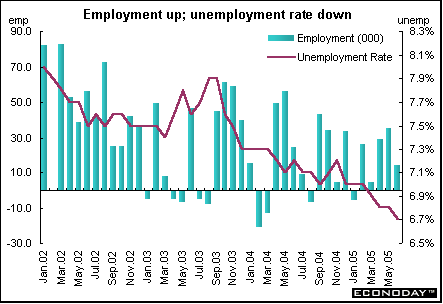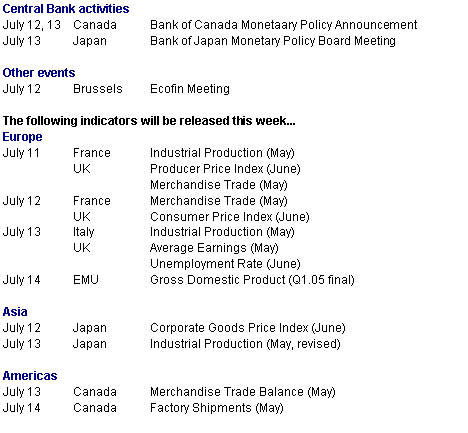Monday, July 11, 2005

Global Markets
Hurricane season for the southern U.S. arrived last week and with it the predictable driving up of oil prices as Gulf of Mexico production areas and refineries along the coast lay in harm's way. Gulf oil production, already down thanks to tropical storm Cindy, saw platforms being evacuated as the much more powerful hurricane Dennis threatened to move into the area over the next several days. Increased crude prices weighed on equities in Asia but boosted European indexes as oil companies such as BP benefited from higher prices. The weaker euro also helped the DAX and CAC as visions of increased exports and profits danced in investors' heads. On the week, four of six Asian/Pacific indexes were down while the DAX declined in Europe. All four indexes in North America were up on the week.
Global Stock Market Recap

Europe and Britain
Stocks in Europe and London were having a good week. The FTSE broke through the 5200 level while the CAC and DAX advanced to fresh three-year highs as the euro dropped to a 13-month low against the dollar. The weaker euro supported European equities in the expectation that a stronger dollar would boost corporate earnings. Equity indexes also were bolstered by a strong performance from the oil and gas sector as crude prices continued to rally.
The London terrorist attacks Thursday prompted a wide spread knee-jerk sell off in equities and a flight to safe haven assets such as bonds, gold and the Swiss franc. The FTSE at one point was down as much as 200 points. But markets rallied as the day progressed on relief that the disruption was not greater and as investors decided the tragedy would have only limited long-term economic effects. Thursday's trading had been muted given the expected policy announcements from both the Bank of England and the European Central Bank even though no policy changes were anticipated.
The CAC and DAX regained much of the ground lost during the previous session to close higher on Friday as the immediate economic impact of the London terrorist attacks faded from equities markets. Travel and tourism company shares that were hit hard on Thursday recovered, and oil stocks climbed higher as crude prices continued to firm. The FTSE regained all of Thursday's initial losses by close of trading on Friday.

It was business as usual for both the ECB and Bank of England Thursday morning despite the unfolding terrorist horror. Both Banks left their policy interest rates unchanged at 2 percent and 4.75 percent respectively. The ECB as usual ignored calls for a cut amid evidence the euro's depreciation is helping the region's economy get traction. The meeting was held via a conference call. Italian Prime Minister Silvio Berlusconi and German Economy and Labor Minister Wolfgang Clement have urged the ECB to lower rates as oil prices above $60 a barrel combined with high unemployment are forcing governments to pare economic growth forecasts. One disadvantage of the declining euro is that the impact of higher oil prices is greater. Crude is priced in U.S. dollars, making higher energy prices more painful.
The Bank of England met amid the terrorist attacks on London's mass transport. However, the Bank held fast, choosing not to panic. The incidents sparked declines in share prices and a 0.7 percent drop in the pound against the dollar. The implied rate on interest-rate futures fell as some traders speculated the blow to confidence from the blasts would prompt the central bank to lower borrowing costs.
The central bank followed its normal practice of making no statement accompanying the decision to leave rates unchanged. The decision came against the background of a slowdown in the U.K. economy, which has prompted speculation that it is only a matter of time before the Bank eases rates. Analysts have been anticipating a rate cut in August when the monetary policy committee will have updated forecasts from their quarterly inflation report.
Asia/Pacific
Asian markets showed little reaction to the terrorist attacks in Friday trading. The indexes had been under pressure all week from high oil prices. The Nikkei and Topix fell due to a weaker-than-expected machine orders report Friday. Stocks had been boosted initially by the yen's continuing weakness against the dollar and strong prospects for the retail sector. On the week, only the Kospi and STI managed to finish on a positive note.

The Reserve Bank of Australia, as expected, kept interest rates unchanged for a fourth month. The RBA doesn't release a statement explaining the decision. Investors expected that the bank would maintain the status quo after RBA governor Ian Macfarlane said in a speech last month that Australia's economy, in its 14th year of expansion, was experiencing a healthy correction. The Australian dollar dropped against the U.S. dollar. The Federal Reserve increased its target interest rate 3.25 percent in June, reducing the rate differential between the two nations' key rates to 2.25 percentage points, the narrowest in almost four years, damping demand for the Australian dollar.
Currencies
The pound sterling was under pressure all last week as traders awaited the Bank of England's interest rate decision. Speculation had been mounting for a rate cut as economic data continued to weaken. However, most analysts still believed that the MPC would wait until August. After the terrorist attacks, sterling sank and hit a new 19-month low on Friday. The currency dropped to $1.7363, its weakest level since December 2003. The Bank of England also sought to end market rumors that it would hold an emergency meeting in the wake of the attacks. A weaker currency should help the British export sector by making their goods more price-competitive. This in turn should help stabilize the slowing economy.

The yen was down for the third straight week as positive U.S. data continued to flow. The euro managed to pick up late support and end the week virtually unchanged. Even though U.S. job growth was below expectations, other data such as the services PMI report were higher than expected. This ensured, for currency traders, that the Federal Reserve would continue on their path of increasing interest rates, widening the spread against both the ECB and Bank of Japan. The euro and yen are down about 12 percent and 10 percent respectively in 2005.

Indicator scoreboard
EMU - June services purchasing managers index edged down to 53.1 from 53.5 in May. Results were mixed among countries. New orders index and input price indexes were down slightly while prices charged were up. An index reading above 50 signals expansion while below 50, signals contraction.

May industrial producer prices declined 02 percent but were up 3.5 percent when compared with last year. Energy prices were down 0.7 percent but up 9.7 percent on the year. Excluding energy, the PPI was flat and up 1.9 percent on the year.

May real seasonally and workday adjusted retail sales were up 1.1 percent and 2 percent when compared with last year. The monthly increase offset April's decline of 1.1 percent. Food drink and tobacco sales were up 2.2 percent while non-food product sales were up 0.5 percent. Sales in Germany, Portugal and France were up but sales in Spain, Luxembourg and Belgium were down.

Germany - May seasonally adjusted manufacturing orders soared 2.7 percent and were up 0.4 percent when compared with last year. Domestic orders were up 0.5 percent while foreign orders jumped by 5 percent. The gains offset April's declines of 0.5 percent and 4.6 percent respectively. Capital goods orders reversed direction and were up 2.7 percent after plunging 3.9 percent in the prior month. The gain was due solely to foreign demand.

May seasonally adjusted industrial output declined 0.2 percent but was up 0.9 percent when compared with last year. Industrial production excluding construction - Eurostat's preferred measure - was down 0.3 percent but up 1.3 percent on the year. Manufacturing output was down 0.5 percent after a gain of 0.9 percent in the previous month. Basic and semi-finished goods output was up 0.5 percent but capital goods sank 2.4 percent while durable consumer goods plummeted 3.9 percent. Both nondurable consumer goods and energy output were up on the month.

May seasonally adjusted merchandise trade surplus was €12.1 billion, down slightly from April's surplus of €12.7 billion. Imports were up 5.9 percent while exports were up 3.8 percent.

May retail sales excluding autos and gasoline stations were up 1.2 percent and 2.7 percent when compared with last year. The data reflect a change in methodology and uses a new set of reporting companies.

Britain - May industrial output was up 0.1 percent but down 1.9 percent when compared with last year. Manufacturing output was unchanged on the month and down 1.7 percent on the year. Seven of 13 groups comprising manufacturing production fell. Five were up and one was unchanged. The biggest drop was in transport equipment production, which slid 0.9 percent in the month. The biggest increase was in food, drink and tobacco production, which rose 1.6 percent.

Asia
Australia - May merchandise trade deficit was A$1.56 billion, about the same as in April. Exports were up 1.7 percent while imports were up 1.5 percent. Exports of non-rural goods, which include metals and minerals, gained 2 percent from April. Rural goods, such as meat, sugar, wheat, and wool, rose 0.4 percent. Exports of services, which include tourism spending, increased 1 percent. Commodities make up more than 50 percent of Australia's exports. Imports of intermediate goods, which include oil and spare parts, gained 4 percent. Capital goods imports, which include business machinery and transport vehicles, were little changed. Imports of consumer goods rose 1 percent.

June employment was up by 41,700 new jobs. This was the 10th month in a row that employment has grown. Unemployment rate declined to 5 percent from 5.1 percent and remains at a 29-year low. Full-time employment increased by 60,200 to 7,190,400 while part-time employment decreased by 18,500 to 2,832,600. The participation rate was 64.7 percent.

Americas
Canada - June employment was up 14,200. Full time employment was up by 52,000 jobs while part time employment was down by 38,000 jobs. Unemployment rate was 6.7 percent, down from 6.8 percent in May. Manufacturing employment edged up by 6,100 while construction employment climbed by 21,000 and jobs in education increased by 11,000. Employment declined in transportation & warehousing as well as in information, culture & recreation.

Bottom line
Despite the obvious distractions, the Group of Eight, meeting in Gleneagles Scotland, concluded with an agreement on both Africa and climate change - although the group's communique lacked explicit details concerning dates, commitments, etc. An unexpected agreement on the need to eliminate farm export subsidies by a credible date (not stated) surprised watchers.
Despite the terrible human cost of the terrorist attacks in London, investors displayed remarkable resilience after the initial shock passed. The FTSE bounced back to hit fresh three-year highs and more than regain all of Thursday's losses. Investors appeared to take the view that while the psychological impact is huge the long-term negative economic consequences of the London blasts were not likely to be significant. Rate cut speculation was a more dominant influence. Although the Bank of England left interest rates unchanged, expectations are growing that the Bank will cut in August.
This week the Banks of Canada and Japan will make policy decisions. The Bank of Canada policy interest rate is currently 2.5 percent. While analysts do not expect the Bank to increase rates this week, they do expect them to go up in the near future. The Bank of Japan is expected to maintain its zero interest rate policy and indicate that it will continue to flood the market with funds to the tune of between ¥30 trillion and ¥35 trillion. The Bank has vowed not to change its interest rate policy until there are credible signs that deflation has ended.
Looking Ahead: July 11 through July 15, 2005




